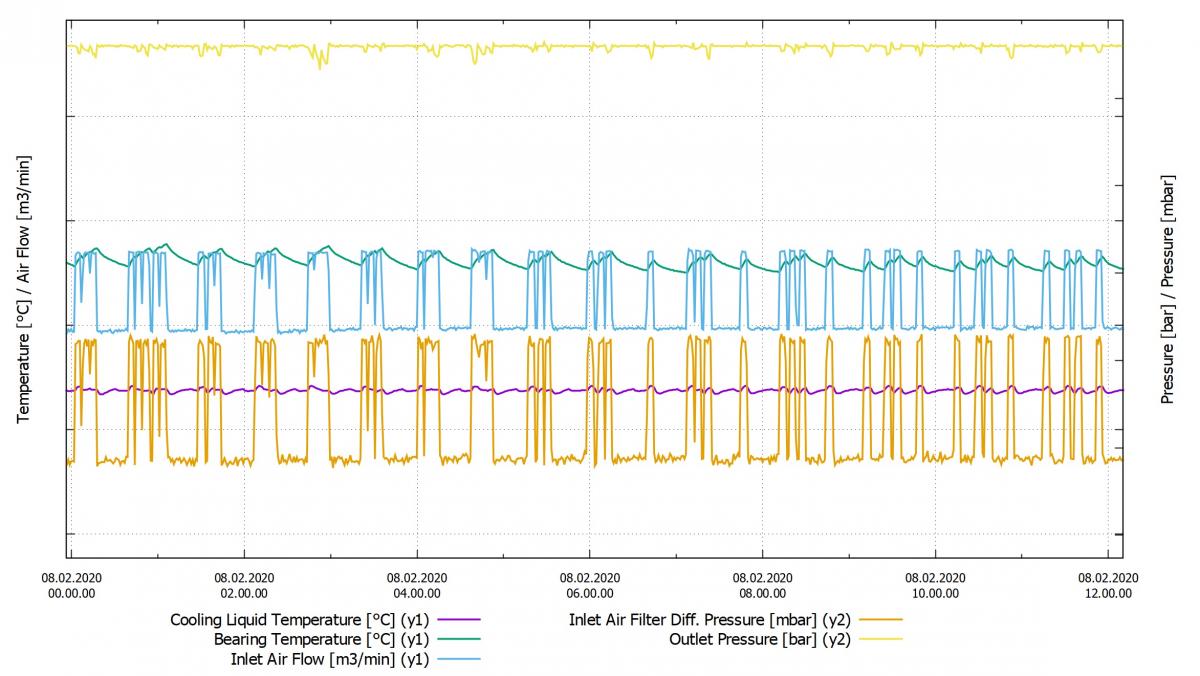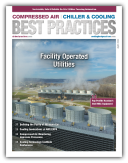Everything today is connected - your car, your refrigerator, your phone, you. The cost of online connections is reaching new lows. Technological advancements are substantial for the amount and quality of data available from modern air compressors. Therefore, it is only logical that air compressors have become connected.
End users are increasingly interested in using the air compressors’ operating data to support their drive in compressed air best practices. This includes increasing economic and ecological sustainability of their operations and integrating the compressed air systems to their overall factory systems. Advancements in technology has increased the capabilities compressed air system manufacturers are offering. This supports end users’ needs to drive improvements in efficiency.
Here’s a review of changes taking place with the continued evolution of remote monitoring of air compressor systems and how the technology stands to improve compressed air maintenance –while adding to the bottom line.
Remote monitoring of air compressors will continue to evolve to help companies improve maintenance and save operating costs.
Needs-based Approach to Maintenance
With a simple built-in connection, manufacturers of compressed air equipment offer their partners totally new ways of serving end users. Just as we used to change engine oil in our cars at every 3,000 miles, we accept the car telling us when it is time to change the oil. The new technology has enabled the air compressor to do the same. Forget the filter change, tied to a fixed-hour limit, the air compressor will tell you when to make the change.
The paradigm shift is defined as a fundamental change in approach. In air compressor maintenance and operating cost, this means moving from fixed or calendar-based maintenance to a need-based approach. For end users this means optimizing or minimizing their cost of maintenance and service, without jeopardizing the equipment performance or reliability. For air compressor manufacturers and distributors, this means the business model is changing fundamentally.
The remote connectivity enables air compressor manufacturers and distributors to become a different type of partner to their customers. Two-way data connection and communication can easily be utilized to optimize the compressed air equipment usage. This can include changing the air compressor operating parameters when the end user operating conditions or needs change. This happens from a remote location, on a short notice, without having to dispatch a service technician to the site. With remote monitoring and access to data, changing compressed air needs are easily identified and the equipment optimized for the changing reality. This means that compressed air manufacturers and distributors become partners in their customers’ operational excellence, consulting them in matters related to this utility.
An example helps illustrate the point: A company with 18 plants and multiple air compressors per site has a modern air compressor, which is remotely monitored by the manufacturer. One day, at 6:26 am, the air compressor sent a text message (SMS) to the monitoring engineer on duty: “Power phase fault.” The engineer logged into the air compressor controls and verified loss of power from one of the three phases. He called the plant service office to discuss possible reasons and actions. The plant service tech’s reaction: He put the phone down and called his supervisor, saying “Now I know why our plant is down.” With the help of this information, the end user’s team got on to the root cause of the issue and was able to get the plant up, minimizing downtime.
Information Enables Decision Making
The increased sensor-monitoring capabilities with the breath and volume of information available in modern air compressors make it easy to change the service and maintenance mode of operation from Reactive (“If something breaks, we’ll fix it”) to Predictive (“We’ll fix it before it normally breaks”) to Preventive (“We’ll fix it just before it actually breaks”). This changes the approach from time-based, where maintenance is performed according to a schedule, to a need-based model in which the information enables decision making.
A typical time-based maintenance program may look like this:
- Oil filter change every 1,000 hours (hrs).
- Air filter change every 2,000 hrs.
- Oil change every 4,000 to 8,000 hrs .
- Service of valve seal kits every 24 months.
- Motor re-bearing work every five years.
As the new data available enables on-time monitoring of the actual maintenance needs, it’s possible to shift from a scheduled maintenance program to a genuinely need-based one. The data indicates when intake filters are reaching end-of-life based on the pd data, which is the pressure differential between the air pressure before and after the intake air filters, indicating the pressure loss from contamination, and replacement can be done when really needed. This technical capability is already available in most high-end air compressors, but not utilized to the full extent. With proper design, air filter changes have been pushed up to 25,000-plus hours without excessive pressure differential or loss of filtration.

Remotely collected and shared air compressor data makes it possible to shift from a scheduled maintenance program to a genuinely need-based one for improved performance and lower maintenance costs. Click here to enlarge.
Emerging Model Drives Data Sharing
With the availability to access the compressed air data remotely, the question “Whose property is it?” becomes relevant. The data could be used to analyze end user’s production and changes in it, which would make the information sensitive in most cases.
Currently, remote connection-based air compressor data collected has not been available to the end customer. Emerging business models with connected compressed air equipment drive the propensity of open data sharing with end users, the true owners of the data. Offering related parties free access to collected data with the main objective to help the end user improve their operations should be the baseline of the new partnership approach to the use of the data. However, due to various reasons, some manufacturers may be slow or hesitant to adapt this open data model.
The GSM-based technology offers very fast communication, e.g., air compressors sending text/SMS messages to local operations and maintenance personnel. This amalgamates the air compressors from a “black box” to an integral part of production, capable of providing timely information for better overall production efficiency and cost.
A 250 horsepower (hp) oil-free Tamturbo turbo air compressor with Variable Speed Drive (VSD) is equipped with active remote monitoring via 4G Modem link.
Here’s an example for further explanation: In this case, a large global brewing company has a remotely monitored air compressor in one of its breweries. When monitoring their newly commissioned air compressor, the supplier noticed the other (older) air compressors were not used in an optimum way – a large capacity unit was loading and unloading when one of the smaller units would suffice. By changing the system operational parameters remotely and advising the customer to change the running logic of the non-connected air compressors, compressed air production stabilized to run more efficiently. This resulted in substantial unloaded energy consumption savings and much more stable compressed air system.
A New Role for Manufacturers and Distributors
The use of technology-enabled, on-time, true and accurate air compressor and down-stream equipment monitoring drives the new business model development. Subscription-based business models are gaining popularity and are quickly becoming a reality for companies who are not interested in owning air compressors when they only need the service of compressed air.
Companies are also motivated by wanting to keep their balance sheet light (by not adding capital equipment) and not wanting to allocate resources to deal with the hassle involved with operating the technology. At a fixed price, either based on a per-month, or cubic feet/meter of compressed air-provided arrangement, the end user enjoys the benefits of this new technology while the manufacturer takes care of the rest. This subscription model is parallel to media streaming services - we don’t need to buy a DVD player and run to a video store to watch movies on demand. The following table highlights the differences between investing in compressed air technology versus the acquisition of compressed air based on a subscription-based business model:
|
|
CAPEX |
Subscription-Model |
|
Capital budgeting required |
Yes |
No |
|
Budget scrutiny |
High |
Low |
|
Approval threshold |
High |
Low |
|
Cost transparency |
Low |
High |
|
Operational responsibility |
High |
Low |
|
Flexibility |
Low |
High |
|
Unexpected service costs |
High |
None |
This means the role of the air compressor distributor is inevitably changing. The new role centers around keeping units running without any disruptions which will be the only way to make money. This makes maintenance and service needs or breakdowns seen as a loss, not as an opportunity to yield profit. However, the same (or actually higher) profit will be made by keeping customers’ production running without disruptions instead of fixing it when it breaks down. This, of course, requires new capabilities, as well as a shift in the mindset of all parties involved. For those who may skeptical, think about what happened to DVD-player or portable CD-player businesses.
Thinking Differently About Compressed Air
Remote capabilities discussed here are already in compressed air equipment, enabling and driving the transformation of air compressor companies from a transactional business model toward a subscription-based partnership model. However, this also requires a mindset shift and willingness from end users to change the way they think about compressed air.
About the Author
Hannu Heinonen, is Vice President, Americas, Tamturbo, tel: 314-662-0188, email: hannu.heinonen@tamturbo.com; and Olli Kuismanen, is Vice President, Global Accounts and Partnership, Tamturbo, tel: 358-40-766-5678, email: olli.kuismanen@tamturbo.com.
About Tamturbo
Tamturbo manufactures and sells industrial air compressors with 100% oil-free technology which is based on VSD controlled, high-speed turbo air compressors with active magnetic bearings making the air compressor wear free with industry’s lowest total cost of ownership. Without a single drop of oil in the system, air compressors are completely risk-free from oil adding any contamination in compressed air. For more information, visit www.tamturbo.com.
All photos courtesy of Tamturbo.
To read more Air Compressor Technology articles, please visit www.airbestpractices.com/technology/air-compressors.




